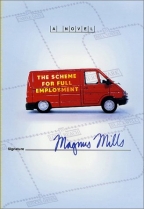The Scheme for Full Employment
Magnus Mills
Picador / St. Martin's Press
US Hardcover First
ISBN 0-312-42163-X
Publication Date: 12-01-2002
204 Pages; $19.00
Date Reviewed: 12-18-02
Reviewed by Rick Kleffel © 2002

REFERENCES
COLUMNS
|
|
|
The Scheme for Full EmploymentMagnus MillsPicador / St. Martin's PressUS Hardcover FirstISBN 0-312-42163-XPublication Date: 12-01-2002204 Pages; $19.00Date Reviewed: 12-18-02Reviewed by Rick Kleffel © 2002 |
|
|
REFERENCES |
COLUMNS |
Science fiction and fantasy need not necessarily include the standard set of spaceships, monsters, dwarves, or any of the other escapist accoutrements that so typify the field. One of the most creative emerging writers of speculative fiction is Magnus Mills, who eschews all of the standard-issue props for a low-key approach that simply takes portions of the world as we know it and re-arranges them in an utterly unique style. 'The Scheme for Full Employment', his third and latest novel, is a wonder of economy on all fronts. Its fantasy is primarily economic, and Mills deploys his fantasy in a laconic, droll prose that is short and to the point. Nonetheless, readers who enter Mills' strange universe will rapidly understand that we're not in Kansas, the UK, or any other country that has ever yet existed. Yes, Mills' world in 'The Scheme for Full Employment' is utterly plausible, but simultaneously, it's utterly implausible -- in the current economic climate. 'The Scheme for Full Employment' is a delightful and restrained piece of fiction that stays in the reader's mind like an intriguing conversation overheard in a restaurant. It's utterly, mundanely real, yet somehow divorced from our reality. It doesn't matter whether you go for a straight-eight or an early swerve. No matter which side of the divide you fall on, you're likely to enjoy Mills take on employment as its own reward.
The unnamed narrator of 'The Scheme for Full Employment' is a five-year veteran of The Scheme. Simply put -- and that's the only possible description -- the employees of The Scheme drive Univans from one depot to another, carrying Univan parts and ensuring that the fleet of Univans stays in service. It's a bootstrap operation that provides steady employment for the members of the scheme and a public image of successful labor. As he novel starts, the unnamed narrator is paired with George, who slips in a bit of business on the side as they drive their Univan from depot to depot. George picks up and delivers pies and cakes in pink and white boxes. It's not exactly kosher, but there's a lot of room for laxity in the Scheme.
Mills focuses on the details and the enjoyable banter of the guys. His prose is limpid clear and extremely readable. The pages slip by as seamlessly as the days of the employees. But Mills is also very sly. The Scheme creates a lot of questions in the reader's mind. How it works is only the beginning. Why it works and why it exists are the more pressing questions. Mills answers them, not with a bang but a sly, subtle nod and a wink.
Even from the beginning the seeds of doubt are sown. Those who like to knock off a bit early, called 'the early swerve', are getting more aggressive with their leave-taking. And those who prefer a whole day, called 'the straight eight', are growing more concerned. By the time a woman shows up on the inspection team, you know things are going to unravel. Mills makes sure that readers can't turn the pages fast enough to discover how it all works out.
Mills does a fantastic job at creating world that looks very much like ours but is emphatically not ours. The ingredients have been shifted in a precise and subtle manner. While most science fiction or fantasy wreaks world-wrecking havoc, Mills is content and crafty enough to slip the readers a mickey that is clear but quiet. The precision of his work here and the clarity of his imagination render his fantastic scenario so real that it almost seems like straight, "this-world" fiction. The realization that 'The Scheme for Full Employment' is clearly not straight "this world" fiction is all the more enjoyable.
Mills is not imagining changes in science or fantasizing the existence of magical powers. Mills is imagining economic concepts and situations that it becomes increasingly clear are not possible in our world. By doing so, he forces the reader to examine some of the concepts at the heart of the universal reign of capitalism and the free market without coming off like a crank. Mills' cast of characters is all determined but dreamy working stiffs. There are no exceptional leaders, there are no sneering bad guys. This is the world as most people know it. The antagonist is the sum of the foibles of a group of average people in an average job. Inevitably, something will give.
'The Scheme for Full Employment' features another perfectly self-contained world created by Magnus Mills. There's an element of a working man's fable in this novel. Mills' simplicity of story, plot and scene lend it an element of universality. There is a lesson to be learned from 'The Scheme for Full Employment', but it blossoms in the enjoyment of Mills' creation. Mills' newest novel has a potentially wide appeal. He's slyly funny, subtly imaginative and so genial he's rather hard to resist. 'The Scheme for Full Employment' is a two-day read. Why resist it? Have a little fun. We all deserve an early swerve.